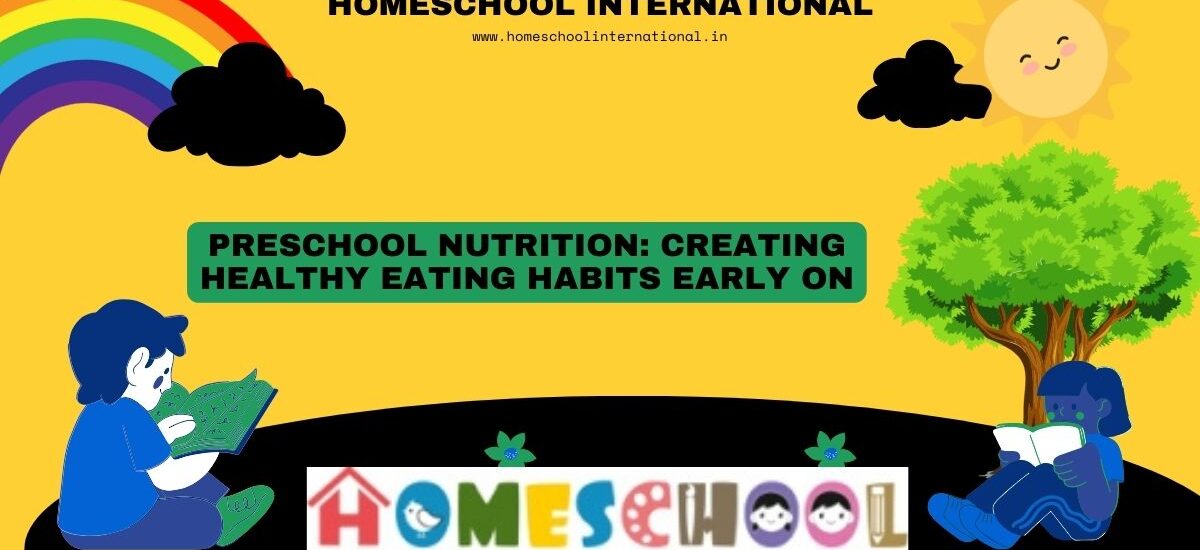Preschool Nutrition: Creating Healthy Eating Habits Early On- In the delicate journey of childhood development, the importance of nutrition cannot be overstated. “Preschool Nutrition” plays a pivotal role in shaping the health and well-being of young children, setting the stage for lifelong habits and behaviors. Welcome to our exploration of “Preschool Nutrition: Creating Healthy Eating Habits Early On.” At Homeschool International, we understand the profound impact that nutrition has on children’s growth, development, and learning. In this blog post, we delve into the critical role of preschool nutrition and how it lays the foundation for a lifetime of health and wellness. Join us as we uncover the key principles, strategies, and benefits of nurturing healthy eating habits in preschool-aged children.
Also Check: Fostering Social Skills: The Importance of Peer Interaction in Preschool
Understanding Preschool Nutrition
- Defining Preschool Nutrition:
- Clarify the concept of preschool nutrition as the dietary intake and habits of children aged three to five years old.
- Emphasize the importance of providing essential nutrients, vitamins, and minerals to support children’s growth and development during this crucial stage.
- Unique Nutritional Needs:
- Discuss the specific nutritional needs of preschool-aged children, including requirements for protein, carbohydrates, fats, vitamins, and minerals.
- Highlight the significance of balanced meals and snacks in meeting these needs and supporting optimal growth and development.
- Nutrition and Cognitive Function:
- Explore the connection between nutrition and cognitive function in preschoolers, highlighting the role of healthy eating habits in supporting brain development, learning, and academic performance.
- Discuss research findings that demonstrate the impact of nutritious diets on children’s cognitive abilities, attention span, and memory.
- The Importance of Early Intervention:
- Stress the importance of addressing nutrition early in life to establish healthy eating habits and prevent nutrition-related health issues later in childhood and adulthood.
- Discuss the long-term implications of poor nutrition in early childhood, including increased risk of obesity, chronic diseases, and developmental delays.
By structuring the content with clear headings and incorporating relevant keywords, this section not only enhances readability but also improves search engine visibility for the topic of understanding preschool nutrition.
Building Healthy Eating Habits
- Offering a Variety of Nutrient-Rich Foods:
- Advocate for providing a diverse range of nutrient-rich foods, including fruits, vegetables, whole grains, lean proteins, and dairy products, to ensure children receive a balanced diet.
- Highlight the importance of exposing children to different flavors, textures, and food groups to expand their palate and promote dietary variety.
- Modeling Positive Eating Behaviors:
- Discuss the role of educators, caregivers, and parents in modeling positive eating behaviors, such as enjoying a variety of foods, eating mindfully, and practicing portion control.
- Emphasize the influence of adult role models on children’s food preferences, attitudes toward food, and eating habits.
- Creating a Positive Mealtime Environment:
- Stress the importance of creating a positive mealtime environment that promotes relaxed, enjoyable dining experiences for preschoolers.
- Discuss strategies for fostering positive mealtime interactions, such as family-style dining, engaging conversations, and avoiding pressure or coercion around food.
- Involving Children in Food Exploration:
- Encourage involving children in food exploration and preparation activities, such as grocery shopping, meal planning, and cooking.
- Highlight the benefits of hands-on experiences with food in promoting food literacy, independence, and a positive attitude toward nutrition.
By structuring the content with clear headings and incorporating relevant keywords, this section not only enhances readability but also improves search engine visibility for the topic of building healthy eating habits in preschool-aged children.
Also Check: Nurturing Curiosity: Science and Exploration in Preschools
Addressing Common Nutrition Challenges
- Understanding Picky Eating Behavior:
- Recognize the common challenge of picky eating behavior among preschool-aged children, characterized by selective food preferences and reluctance to try new foods.
- Discuss factors contributing to picky eating, such as sensory sensitivities, food neophobia, and developmental stages.
- Promoting Exposure to New Foods:
- Offer strategies for promoting exposure to new foods and expanding children’s food repertoire, such as offering small tastes, presenting foods in a variety of ways, and involving children in meal preparation.
- Emphasize the importance of patience, consistency, and positive reinforcement in addressing picky eating behavior.
- Managing Food Allergies and Dietary Restrictions:
- Address the challenge of managing food allergies and dietary restrictions in preschool settings, including accommodations for children with allergies or intolerances.
- Discuss the importance of clear communication, collaboration with parents and healthcare professionals, and implementation of allergy-safe practices in preschool environments.
- Encouraging Healthy Snacking Habits:
- Highlight the importance of promoting healthy snacking habits to support children’s nutritional intake between meals.
- Offer suggestions for nutritious snack options, such as fresh fruits, vegetables, whole grain crackers, yogurt, and nuts, while limiting processed snacks high in sugar, salt, and unhealthy fats.
By structuring the content with clear headings and incorporating relevant keywords, this section not only enhances readability but also improves search engine visibility for the topic of addressing common nutrition challenges in preschool-aged children.
Addressing Common Nutrition Challenges
- Dealing with Picky Eating:
- Discuss strategies for managing picky eating behaviors in preschool-aged children, such as offering a variety of food options, involving children in meal planning, and presenting foods in creative ways.
- Highlight the importance of patience, consistency, and positive reinforcement in addressing picky eating habits and promoting food acceptance.
- Managing Food Allergies and Dietary Restrictions:
- Provide guidance on accommodating food allergies and dietary restrictions in preschool settings, including communication with parents, creating allergy-safe environments, and educating staff and children about allergens.
- Emphasize the importance of vigilance and preparedness in preventing allergic reactions and ensuring the safety of all children.
- Promoting Healthy Snacking:
- Discuss the role of healthy snacking in supporting children’s nutritional intake and energy levels throughout the day.
- Offer suggestions for nutritious snack options, such as fruits, vegetables, whole-grain crackers, yogurt, and nuts, while avoiding overly processed or sugary snacks.
- Encouraging Hydration:
- Highlight the importance of staying hydrated for children’s overall health and well-being.
- Discuss the benefits of offering water as the primary beverage choice and encouraging children to drink water regularly throughout the day.
By structuring the content with clear headings and incorporating relevant keywords, this section not only enhances readability but also improves search engine visibility for the topic of addressing common nutrition challenges in preschool-aged children.
Also Check: The Role of Technology in Early Childhood Education
Conclusion: Preschool Nutrition- Creating Healthy Eating Habits Early On
- Reflecting on the Journey:
- Reflect on the importance of preschool nutrition in laying the foundation for lifelong health and wellness.
- Acknowledge the journey of exploration and learning undertaken in this blog post to understand the significance of healthy eating habits in preschool-aged children.
- Empowering Children and Caregivers:
- Emphasize the role of nutrition in empowering children to thrive physically, cognitively, and emotionally.
- Highlight the collective efforts of caregivers, educators, and parents in fostering a supportive environment that promotes healthy eating habits and positive relationships with food.
- Commitment to Continued Support:
- Express a commitment to continued support for preschool nutrition initiatives, both at home and in educational settings.
- Encourage ongoing collaboration, communication, and education to ensure that every child has access to nutritious foods and the opportunity to develop lifelong healthy eating habits.
- Gratitude and Encouragement:
- Extend gratitude to readers for their interest in preschool nutrition and their dedication to promoting the well-being of young children.
- Encourage readers to take the insights gained from this blog post and apply them in their interactions with preschool-aged children, fostering a culture of health and wellness in their communities.











